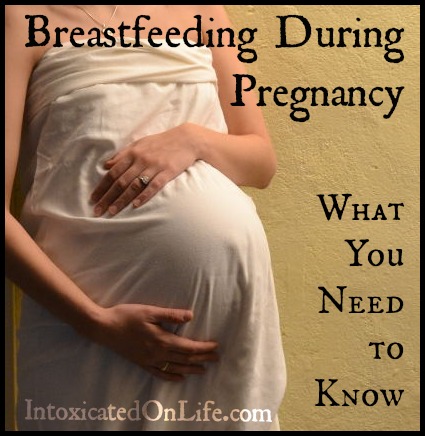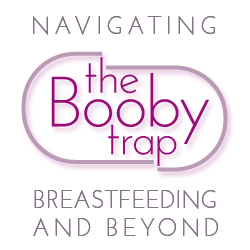
When my husband and I decided to try and conceive our second child, I was still nursing our toddler daughter. I had a lot of questions about nursing through pregnancy. Tandem nursing was something I’d always wanted to do. In order to do that, I knew I would need to nurse through my pregnancy.
Through La Leche League and online parenting forums, I found that it was safe to nurse through pregnancy, but there was much I didn’t know before I experienced it. I didn’t know what physical and emotional changes my body would undergo. I also wasn’t aware of how the relationship with my toddler would change.
Benefits of Breastfeeding During Pregnancy
Fatigue is a very common symptom of pregnancy. Having a toddler running around made my fatigue all the more difficult to deal with. Many moms find continuing to breastfeeding allows them to have down time they wouldn’t get otherwise.
Having my firstborn snuggle my belly and feel her baby sister kick opened up a lot of opportunity for discussion about the new baby that would be joining our family.
I also feel that it created a strong bond between the girls before our second was even born. Many studies say that talking to your unborn child is a great way for mothers and fathers alike to bond. Newborns recognize the voices of those who talk to them in utero. I found this true with my older nursling and her newborn sister as well.
Tandem nursing was a great benefit and a big reason we stuck out all the hiccups along the way.
Are there Safety Concerns?
Some people are concerned that breastfeeding while pregnant will cause miscarriage or preterm delivery. This is an unfounded concern in most cases.
Nursing does cause contractions of the uterus, however these contractions are comparable to the contractions caused by sexual arousal, orgasm, or any nipple stimulation. Mothers who have been placed on pelvic rest are typically advised to stop nursing because these could be cause for alarm in their specific cases. The same holds true for mothers who are experiencing preterm labor.
Some mothers and their caregivers choose the wait-and-see approach in these instances, but it is important to be honest and forthcoming with your caregivers about nursing should you have any complications during your pregnancy. While breastfeeding during pregnancy will not cause complications, in the face of some already existing complications it can be necessary to wean for the duration of pregnancy.
Physical Changes
Pregnancy brings on many physical changes by itself. Hormonal shifts that cause these changes can bring changes to your nursing relationship as well.
One of the first issues many mothers face is nipple soreness, a very common early-pregnancy symptom that is made all the worse for some mothers by breastfeeding. Some mothers find relief after a few weeks. When relief is found varies mother to mother as does the extent of sore nipples. Some mothers try cold compresses to ease the soreness.
Nursing boundaries that many moms find effective for helping soreness are limiting nursing sessions to certain times of day or limiting the length of nursing sessions to cut down the amount of stimulation. Many moms also choose to stop a breastfeeding session when their nursling gets too wiggly. It is important to find your own personal limitations and do what is best for you and your nursling.
Most likely, during pregnancy, your milk will change. The changes vary from mother to mother. Some mothers dry up almost immediately. Others seem to have enough milk for their nursling throughout pregnancy. Some have their milk supply decrease and/or change to colostrum. This can happen from the very first weeks to the very end of pregnancy.
Drinking plenty of water, eating well, and nursing will help keep your supply up as best as it is able to stay. Nothing can really prevent the pregnancy hormones from overriding the milk producing hormone, prolactin, and changing your milk if it is going to change. Fenugreek, an herb commonly used to increase supply, should never be used during pregnancy as it can cause miscarriage.
Many nurslings will self-wean when the milk changes or dries up because they become frustrated or dislike the taste. Some nurslings don’t mind continuing to “dry nurse” in the absence of milk. As long as you are comfortable with it, it is beneficial for your continued bond and easing the transition of a new sibling.
Emotional Changes

I was entirely unprepared for the nursing aversions I began to feel about midway through my second pregnancy. I had always enjoyed nursing my toddler, but there were times while pregnant that it made me very uncomfortable, emotionally. Tandem nursing was very important to me, so I used boundaries to limit the time we were nursing. I feared that my aversions would not go away and that I wouldn’t want to nurse my newborn when she finally joined us Earthside.
Thankfully, I went on to enjoy nursing both of my little ones after birth. Most mothers who experience pregnancy-related nursing aversion do find that they begin to enjoy nursing again after birth, if they enjoyed it prior to getting pregnant. Some moms find that nursing their toddler continues to be an uncomfortable experience and choose to either enforce more boundaries or wean at this time. Those who continue to have nursing aversions with their infant well after birth may have D-MER (Dysphoric Milk Ejaculation Reflex) and should seek help if they wish to continue breastfeeding.
Breastfeeding Nutrition During Pregnancy
A mother nursing through pregnancy will need more calories than mothers who are not. Water intake is extremely important as well as having a healthy, balanced diet.
A general rule of thumb for water intake is half your weight in ounces of water. So a 160 pound person would need to take in 80 ounces of water per day. This should increase as weight is gained through pregnancy. For mothers with nurslings under a year, formula supplementation often becomes necessary to make up for loss of supply. Watching for hydration and weight changes in the nursling is helpful in assessing the need for supplementation. For toddlers who are eating a wide variety of solid food, just continue offering a healthy variety of foods.
Megan Rabideau lives with her husband, Don, and their two daughters, Lydia and Charlotte. She is a certified childbirth educator. She enjoys crocheting and sewing in her free time.
Original article and pictures take www.intoxicatedonlife.com site
Комментариев нет:
Отправить комментарий